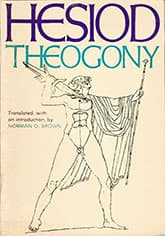Theogony
Critique • Quotes
 1980 translation
1980 translationFirst publication
c.700 BCE
Literature form
Poem
Genres
Mythology
Writing language
Ancient Greek
Author's country
Greece
Length
Approx. 1,260 lines
Hesiod shows how good Homer is
The greatest thing about Hesiod's Theogony is that it's short.
It was important to the ancient world for other reasons as well, but this does not translate into a particularly rich experience for modern readers. Unless they're historians or classicists interested in the Greek worldview.
"Theogony" means origins of the gods and Theogony is mainly about how the Olympian gods came about. After a long imploring of the muses, it starts with the forming of the world from Chaos, which at the time meant the gap separating Heaven and Earth.
Apparently it happened like this: "Chaos was first of all, but next appeared / Broad-bosomed Earth...." Just like that. Pretty dramatic, huh? And we thought the old Greeks were such deep thinkers. It carries on with various entities lying with each other and giving birth to various other entities. Except for Dark Night, who sleeps with no one but still gives birth to Distress and Blame. It's a strange world. Almost as bizarre as that of "Genesis" in the Hebrew Bible (Old Testament), which was being worked up about the same time, just around the corner of the Mediterranean.
You may notice a logical problem in the passage quoted above. If Chaos was what separated Heaven from Earth, then how could it then give birth to Earth? This kind of contradiction gives scholars the idea that Hesiod did not originate the creation story himself but patched together several previously existing, not-quite-compatible accounts. (Again, a little like "Genesis".)
As the story progresses, the gods come into various conflicts with each other, revolutions take place and the gods we know from other Greek myths, headed by Zeus, come to power. Some of the gods also start fooling around with mortals and we learn the origins and background of famous earthbound figures of mythology, like Jason, Calypso and Odysseus.
You'd think in all this there would be some bloody good stories of intrigue, backstabbing and titanic battles. There are many such bloody stories, but they're told so badly that the reader never becomes involved.
So, maybe Hesiod wasn't trying to tell good stories but just to lay down the basics of what the Greeks should believe about the world. So read this Hesiod if you're interested in that kind of thing. Otherwise stick to Homer.
My copy of this is the Penguin volume translated by Dorothea Wender and also includes Works and Days, as well as work by Theognis. I couldn't say if any other translations improve Hesiod's work.
— Eric
Critique • Quotes

